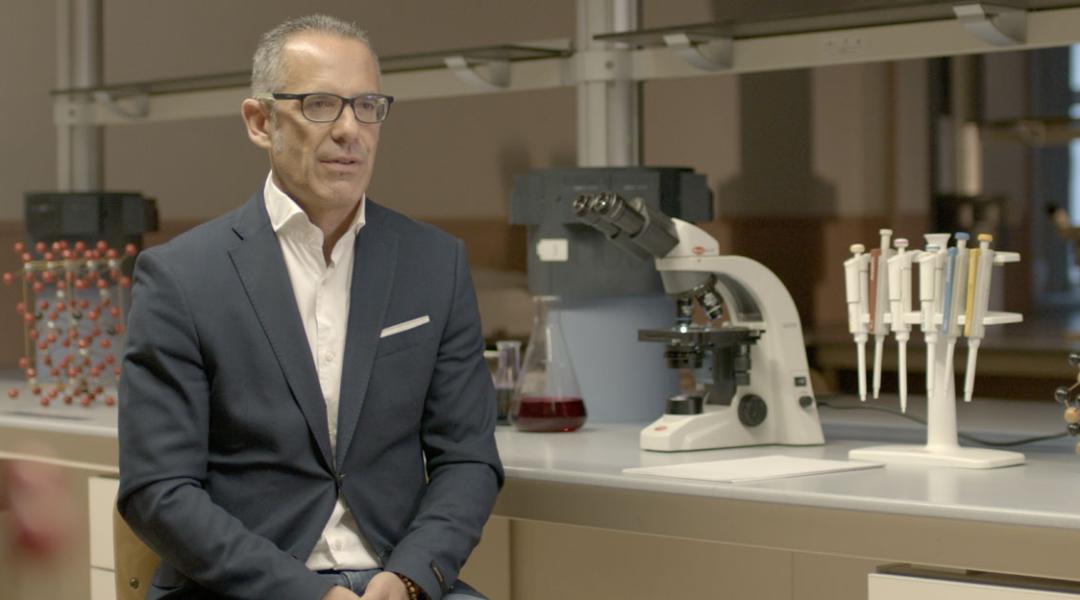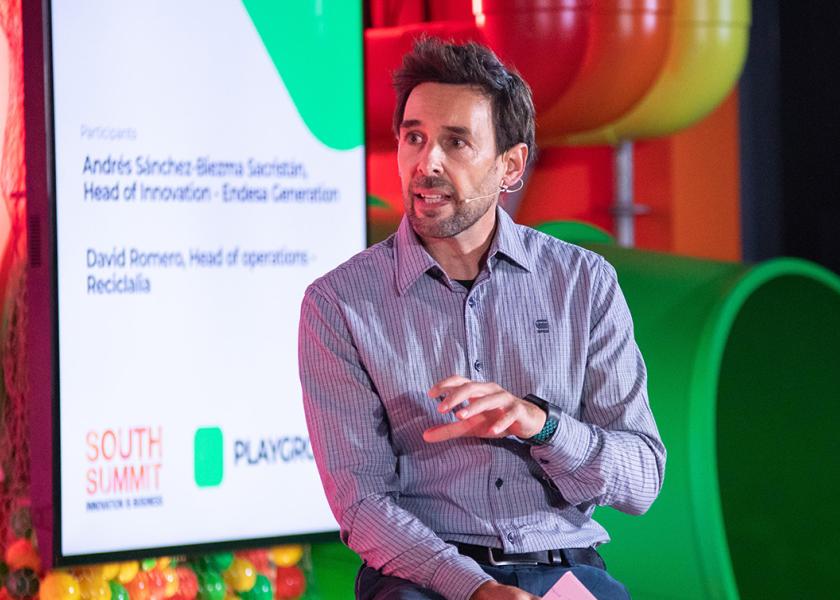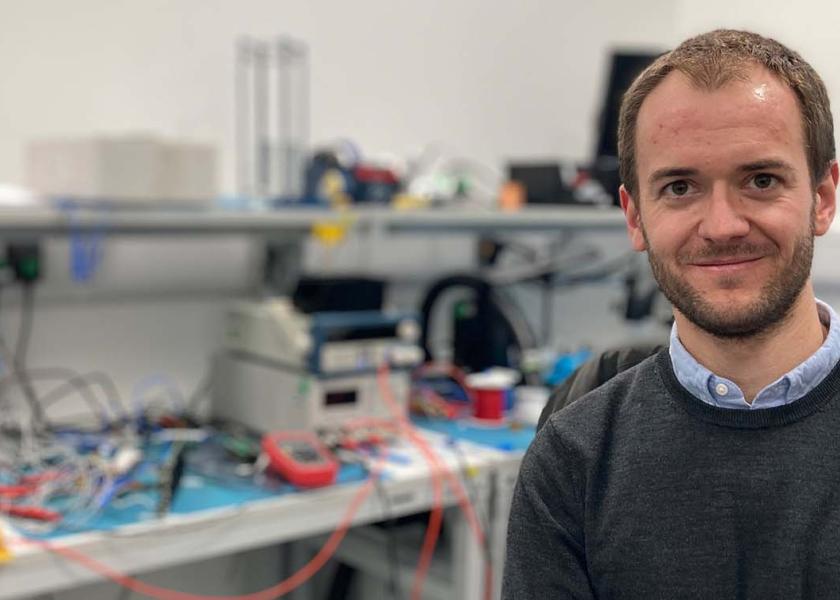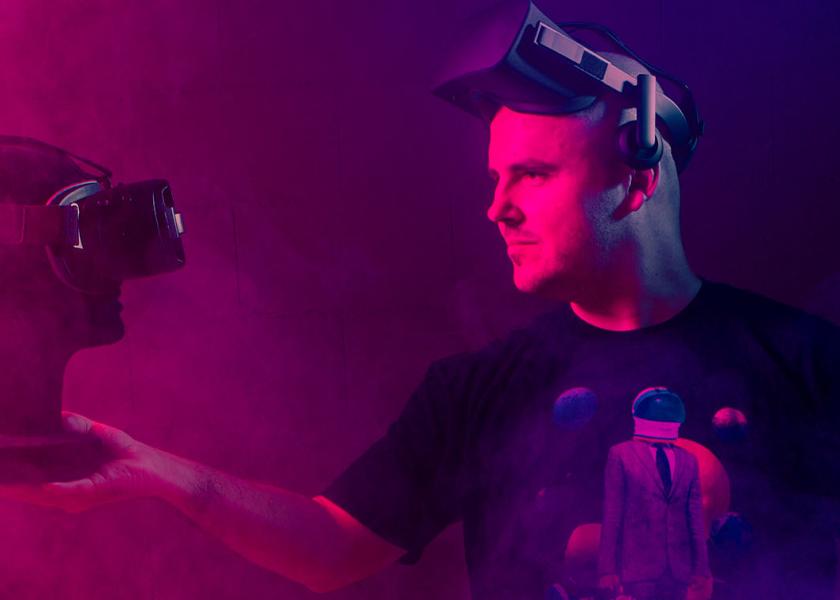Gorka Orive
The humanist scientist

Spanish science is at an all-time high, and one of the people responsible for this is Gorka Orive, a researcher from Álava who has taken a giant leap for the early diagnosis of Alzheimer’s. He takes us on an interesting journey to discover the health challenges we currently face and the keys to a more sustainable and innovative future.
Visiting Vitoria is like catching up with an old friend: you always wonder why you don’t see each other more often and they make you feel at home. If you’re lucky enough to be with Gorka Orive (Vitoria-Gasteiz, 1976), that feeling grows exponentially. Orive holds a doctorate in Pharmacy, and is a researcher and professor at the University of the Basque Country (UPV/EHU), but could also easily be a science communicator and, in fact, he’s all the above. After spending a day with him, I decide to call him The humanist scientist because the way he speaks, interacts with others, and the projects he has launched suggest what he later confirms during our interview: the purpose of science must be to improve people’s lives.
Under this premise, we meet up with him on World Alzheimer’s Day, the most prevalent type of dementia that currently affects around 50 million people around the world. The predictions aren’t very encouraging: the World Health Organization (WHO) estimates that in 2050 there will be more than 150 million people with this disease and its financial cost is 1% of world GDP, not to mention the brutal social impact it has.
He tells us: “as well as there currently being no cure for it, one of the biggest problems with this disease is its underdiagnosis: seven out of every ten people have Alzheimer’s and don’t know it, given that detection techniques are extremely costly and invasive, and therapies are applied when the disease is very advanced.” For this reason, the scientific community has been researching new early diagnosis methods for years and Orive, perhaps also moved by his personal experience with the disease —both his grandmothers had dementia— discovered a key element: saliva. “We’ve always thought that the immune response, the oral cavity, have something to do with the brain. We were amazed when we detected that Alzheimer’s patients have extremely low levels of a protein present in saliva, lactoferrin. It’s as if it were a fever, but the opposite: the decrease in these biomarkers indicate an elevated risk of having the disease.” Keeping in mind that Alzheimer’s starts to develop in our bodies between 15 to 20 years before producing symptoms, this simple, cost-effective, and easily-scalable diagnostic aid is a giant leap for the early diagnosis —and, therefore, effective treatment— of this disease.
The humanist scientist
Gorka Orive is committed to the cause, he believes in his profession and those that make it possible: “The most important thing in science are the scientists,” he declares, regarding his work as professor and director of doctoral theses at the Faculty of Pharmacy at UPV/EHU. “We must educate and guide future scientists, but also give them certain certainty —he defends—. We can’t tell them that this is a path that ends on a cliff because there aren’t enough opportunities.”
“You have to face talent head on, not over your shoulder or in fear, but rather eager to be associated with it”
The future of science is at the heart of these generations that support Spanish talent within and beyond our borders: “Spain is a particularly important wellspring of ideas, talent, and innovation. Personally, I’m a fierce advocate of talent. You have to face talent head on, not over your shoulder or in fear, but rather eager to be associated with it,” Orive tells us.
Talent must also go hand in hand with recognition. When we bring up the Premio de la Academia Iberoamericana de Farmacia [Pharmacy Ibero-American Academy Award] he’s been granted this year, Gorka Orive tells us that “it’s a way of recognising the work of the entire team, of knowing that you’re on the right track and, above all, of feeling the responsibility to carry on.” This award recognises his research work, but also his educational profile on social media, especially at the beginning of the pandemic, when there were a lot of questions and not very many answers. At the time, he went viral for providing reliable hard data, in contrast to the denier trends and fake news that were rampant across social media: “I believe that anyone who works in science has an obligation to society, especially during difficult times,” he convincingly declares.
A challenging but optimistic future
This synergy of talents has precisely been forged between the walls of the Faculty of Pharmacy at UPV/EHU, where we chat to Gorka Orive. This is the birthplace of another big project he has promoted alongside fellow researcher Unax Lertxundi, this time based on the drug pollution of Vitoria’s waters: “Of the 4,000 drugs or active ingredients currently on the market, 1,000 of them have already been detected in the ecosystem,” he explains. From the start of their research, 25 scientific articles have been published on the topic, the latest in the prestigious specialised Science magazine last July, which force us to confront an issue that stems from our drug consumption and their direct impact on the environment.
“We are currently facing huge health challenges, but there are also breakthroughs that make us believe in a more hopeful future”
This researcher from Álava believes that these lines of research, very much in line with the Sustainable Development Goals (SDGs), will lead the most significant breakthroughs in the years to come: “Over the next two decades, our efforts will focus on environmental topics, looking after our environment, for a more approachable and sustainable life —Orive shares—. The future will feature big health challenges, but there are also ongoing projects that make us believe in a more hopeful future. Just a century ago, humans had a life expectancy of 40 years, and we already double that. We’re defying biology itself and this is partially thanks to breakthroughs in health care and pharmaceuticals.”
“A country that wants progress must have a solid scientific and innovative heart”
Keeping in mind the new challenges that this everchanging reality throws at us —the pandemic has taught us this much—, innovation plays a key role in scientific progress. Orive concludes: “A country that wants progress must have a solid scientific and innovative heart. Concepts like research, development, and innovation create a strong synergy to continue moving forward and obtain results.” We must take note, our future depends on it.


